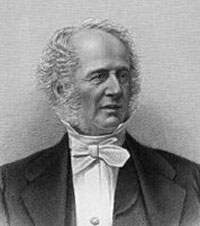Cornelius Vanderbilt (1794-1877)
Cornelius Vanderbilt (May 27, 1794 - January 4, 1877) was a U.S. entrepreneur who built his wealth in shipping and railroads and is the patriarch of the Vanderbilt family.
 Cornelius Vanderbilt was the fourth of nine children born in Port Richmond on Staten Island in New York to a family of modest means. His great-great-great-grandfather, Jan Aertson, was a Dutch farmer from the village of De Bilt in Utrecht, the Netherlands, who immigrated to New York as an indentured servant in 1650. Aertson's village name was eventually added to the Dutch "van der" (of the) to create "van der bilt" which was eventually condensed to Vanderbilt.
Cornelius Vanderbilt was the fourth of nine children born in Port Richmond on Staten Island in New York to a family of modest means. His great-great-great-grandfather, Jan Aertson, was a Dutch farmer from the village of De Bilt in Utrecht, the Netherlands, who immigrated to New York as an indentured servant in 1650. Aertson's village name was eventually added to the Dutch "van der" (of the) to create "van der bilt" which was eventually condensed to Vanderbilt.
As a young boy, Cornelius Vanderbilt worked on ferries in New York City, quitting school at age 11. By age 16, he was operating his own business, ferrying freight and passengers. On December 19, 1813, Cornelius Vanderbilt married his cousin and neighbour, Sophia Johnson (1795-1868), daughter of his mother's sister. He and his wife had thirteen children one of which, a boy, died young. By 1830, Vanderbilt's business had expanded to the Hudson River. Soon he controlled coastal trade along the entire coast of New England. During the California Gold Rush, he ran a steamship line from New York to California via Nicaragua.
In 1844 Vanderbilt was elected as a director of the Long Island Rail Road, which at the time provided a route between Boston and New York via a steamboat transfer. In 1857 he became a director of the New York and Harlem Railroad.
In the early 1860s, Vanderbilt started withdrawing capital from steamships and investing in railroads. He acquired the New York and Harlem Railroad in 1862-1863, the Hudson River Railroad in 1864 and the New York Central Railroad in 1867. In 1869 they were merged into New York Central and Hudson River Railroad. By 1873, he had extended the lines to Chicago, Illinois.
After the death of Sophia Vanderbilt, he eloped to Canada where on August 21, 1869 he married a distant cousin from Mobile, Alabama by the name of Frank Armstrong Crawford. Ms. Crawford was 43 years his junior. It was her nephew by marriage that convinced Cornelius Vanderbilt to commit funding for what would become Vanderbilt University.
Ruthless in business, some say Cornelius Vanderbilt made few friends in his lifetime but many enemies. His public perception was that of a vulgar, mean-spirited individual who made life miserable for everyone around him, including his family. In his will, he disowned his sons except for William who was as ruthless in business as his father and the one Cornelius believed capable of maintaining the business empire. At the time of his death, Cornelius Vanderbilt's fortune was estimated at more than $100,000,000. He willed $95,000,000 to son William but only $500,000 to each his eight daughters. His wife received a $500,000 in cash, their modest New York City home, and 2,000 shares of common stock in New York Central Railroad.
Vanderbilt gave little of his vast fortune to charitable works, leaving the $1,000,000 he had promised for Vanderbilt University and $50,000 to the Church of the Strangers in New York City. Otherwise, his charity mainly matched his infamous statement "The public be damned". He lived modestly, leaving his descendants to build the flock of Vanderbilt houses that characterize America's Gilded Age.
Cornelius Vanderbilt was buried in the family vault in the Moravian Cemetery at New Dorp on Staten Island. Three of his daughters and son Cornelius Jeremiah Vanderbilt contested the will on the grounds that their father had insane delusions and was of unsound mind. The unsuccessful court battle lasted more than a year and Cornelius Jeremiah committed suicide in 1882.
 Cornelius Vanderbilt was the fourth of nine children born in Port Richmond on Staten Island in New York to a family of modest means. His great-great-great-grandfather, Jan Aertson, was a Dutch farmer from the village of De Bilt in Utrecht, the Netherlands, who immigrated to New York as an indentured servant in 1650. Aertson's village name was eventually added to the Dutch "van der" (of the) to create "van der bilt" which was eventually condensed to Vanderbilt.
Cornelius Vanderbilt was the fourth of nine children born in Port Richmond on Staten Island in New York to a family of modest means. His great-great-great-grandfather, Jan Aertson, was a Dutch farmer from the village of De Bilt in Utrecht, the Netherlands, who immigrated to New York as an indentured servant in 1650. Aertson's village name was eventually added to the Dutch "van der" (of the) to create "van der bilt" which was eventually condensed to Vanderbilt.